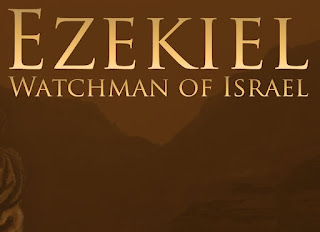Ezekiel's visions are perhaps among the most extraordinary as to evoke imageries that came out of modern science fictions. Like Jeremiah, Ezekiel was also a priest called to a prophetic ministry (1:3). Jeremiah was a man of tears, but Ezekiel was a man of visions. And his visions of the glory of the LORD was no less spectacular compared to Isaiah's, or even the apocalypse of John the apostle.
As a prophet who ministered among the early Jewish exiles to Babylon, Ezekiel employed parable, signs, symbols and even live dramas to bring God's words to a devastated people. Like his name which means 'God strengthens', the prophet is being strengthened by his visions of God's glory and power, in order to bring hope and comfort to his hearers in the midst of a dark and depressing setting.
Interestingly, Daniel who was the first to be deported among the exiles, was mentioned three time by Ezekiel in his writings (14:14, 20; 28:3). While Daniel attained prominence politically in the palace, Ezekiel attested powerfully to the prominence of God among the people. No wonder he was addressed by God as 'son of man' more than ninety times—a title fittingly used by Jesus Christ Himself in the gospels. In fact, his very first vision at the river Chebar (1:1-10) contains vivid description of four-face angelic beings that many Bible scholars believed, pointed to the characteristics of the true 'Son of Man' depicted within the gospels.
The book of Ezekiel bridges the gap between Jeremiah's closing ministry and the beginning of Daniel's story. While there was no hope of immediate reprieve or return from the captivity, the visionary prophet foresaw a day when God shall bring to life again the valley of dry, lifeless bones. The present gloom will be replaced by a future glory, and when God put His Spirit in man again, then 'you shall know that I the LORD have spoken and performed it.' (37:14)
OUTLINE OF EZEKIEL
1. The Appearance of God's Glory (1:1-3:27)
a. Ezekiel's Vision (1:1-28)
Living Creatures | Wheels | Firmament | Man
b. Ezekiel's Commission (2:1-3:27)
Call | Scroll | Watchman
2. The Departure of God's Glory (4:1-24:27)
a. Four Signs (4:1-5:17)
Clay Tablet | Lying on Left=390 days, Right=40 days
Defiled Bread | Razor and Hair
b. Two Sermons (6:1-7:27)
Consequences of Idolatry | Captivity
c. Four Visions (8:1-11:25)
Glory | Abominations | Marking | Departure
d. Signs, Messages and Parables (12:1-24:17)
Signs—Belonging | Removing | Trembling
Rebukes—False Prophets | Idolatrous Elders
Parables—Vine | Marriage | Two Eagles
Sins of the People and Princes | Withered Vine
Judgment on Jerusalem
3. The Vindication of God's Glory (25:1-32:32)
a. Judgment on the Nations (25:1-17)
Ammon | Moab | Edom | Philistia
b. Judgment on the North (26:1-28:26)
Tyre | King of Tyre | Sidon
c. Judgment on the South (29:1-32:32)
Egypt—Desolation | Destruction | Lamentation
4. The Return of God's Glory (33:1-48:35)
a. The Rebirth of a Nation (33:1-39:29)
Watchman | Shepherds—False | True
Edom | Nations | Valley of Dry Bones
Two Sticks | Gog and Magog
b. The Renewal of All Things (40:1-48:35)
New Temple | Worship | Land









